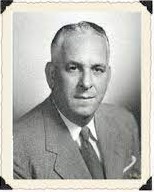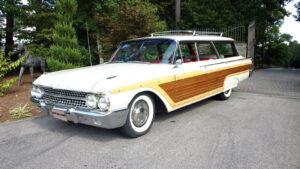Jan 1, 2023

My grandfather, Joe Marcionette (1901-1991) gave us memories of the way things used to be! He was an incredible man and larger than life figure. Joe was a town selectman in the 50s and 60s, and he enjoyed the office and position immensely.
He also owned the Jenny gas station, now the site of the Middlesex Bank, across Main St. from the United Church of Christ. That location was perfect for Joe, who loved being where whatever action there was in the center of the town and the Medfield Town Hall.
Joe had a flamboyant streak and liked to meet and greet his customers and press the flesh. He often pumped the gas himself – it was cheap in those days, just 26 cents a gallon – and most of the profits came from the done by the mechanics.
Here’s a brief glance at his world. In the mid-fifties and, Joe bought a boxer puppy, and he named her Jenny after his station. Joe and Jenny went just about everywhere together. It was remarkable how smart Jenny was. Over time, Joe taught her many tricks that she would perform in front of everyone at the gas station or at home. Joe even had a regular routine with Jenny “speaking” – only in dog language, of course.
As the town selectman, Joe never missed the chance to be in the public eye. On the Memorial Day in 1957, Joe was asked to throw out the first pitch of opening day of the Little League season. He was very dapper, in a light gray suit and tie and a fresh white shirt and shined shoes. The crowd in the stands, as well as the two teams about to play, remembered the way he threw the ball. It was smooth, clean and straight down the middle. No fast ball necessary. It wasn’t a perfect strike, but Joe got the job done and had a gift for making things look easy. He was very nimble for such a big man.
Joe had a big appetite, as indicated by burgeoning, portly waistline. Kidding aside about his girth, Joe believed “a chicken in every pot” applied to all Americans – everyone should be well fed and able to put good food on their tables. He grew up during the Depression when times were tough.
 Joe’s reputation included many acts of charity. If one needed a favor, you could ask Joe, and the favor could range from borrowing one of his cars from the gas station or to lending someone a $20 bill. Joe could advise, supervise and systematize nearly everything. Always smooth, clean, straight a down the middle.
Joe’s reputation included many acts of charity. If one needed a favor, you could ask Joe, and the favor could range from borrowing one of his cars from the gas station or to lending someone a $20 bill. Joe could advise, supervise and systematize nearly everything. Always smooth, clean, straight a down the middle.
During the late 50s, Joe started the “Light a Bike” campaign. He went to speak at the Medfield school and promoted a bicycle safety program. It called for putting reflective and florescent silver and gold stickers/decals on the front and rear fenders of our bikes. It was especially helpful during dusk and evening when kids might have been riding their bikes home. The program was a great success, and the light stickers/decals were put on the bikes of over 500 kids at the Jenny gas station on a bright Saturday morning. Joe seemed to glide through the huge crowd of kids, always charismatic, enjoying every minute.
At Christmastime in the 50s, happy kids in Medfield would line up to see Santa Claus, and after a little chat with him, you’d often hear them say, “Merry Christmas to you, too, Mr. Marcionette!” Joe loved it!
Joe loved Medfield politics and practiced it masterfully. He served as a selectman during many of the years between 1947 and 1976. He also served on the finance committee and the park and planning board. He was honorary chairman of the Medfield Bicentennial Committee from 1975-1976.
Joe was like the energizer bunny, always on the go. Joe helped many a local political candidate achieve office and was involved as a pioneer in making Medfield what it is today. He was either helping to establish projects like the Jimmy Fund, the Medfield Little League or participating in the founding of the Stephen Hinkley Swim Pond as well as many other enterprises that called for his support and devotion.
In Joe’s day, he would “let his fingers do the walking, and his mouth do the talking.” Many people realized that the world was so much better with him in it. He had a soothing effect on people, encouraging a calmness over troubled waters and times, rendering a peaceful assurance and tranquility. Joe left an impact on our world of Medfield as if it was his shining Camelot.
Joe Marcionette on Civil Rights
Joe – always for the underdog –proudly supported civil rights.
Back in June of 1956, my grandfather, Joe Marchionette, took my family to Hyannis, Cape Cod for a weekend vacation. En route in Wareham, he stopped at a roadside stand where young Black teens were selling fresh strawberries.
This was my first personal encounter with African Americans. The girls were very pleasant and appreciated the business. My grandfather handed one of the girls a $10 bill. She had to make change and with that she quickly ran with the $10 bill into her family home. She got the change from her mother, who waiting at the kitchen door. When the girl returned my grandfather tipped the young girl. She was delighted and with that, we were on our way.
Sometimes the unexpected seeds of enlightenment are sown in the earliest times of our lives.
On June 26, 1962, members of the Medfield Park and Recreation Committee took all the members of the Medfield Little League to Fenway Park to watch the Boston Red Sox play a game against the California Angels. As young kids, we were all excited to be sitting behind the Sox dugout.
None of us had ever heard of the pitcher, Earl Wilson, but we could see that he was African American as he stood on the pitcher’s mound. His fastball dazzled the opposing batters. By the end of the game, he had hit a home run and had pitched a no-hitter. He made a great impression on all of us that day especially after hearing that he told a reporter that the day was just was just like any day other at the ballpark. This was such a modest statement from a man who became one of the first Blacks to play for the Boston Red Sox.
What impressed us most was how this man handled the pressure in a baseball city that had few Black role models. When the Red Sox started the next season in Winter Haven, Florida, Earl Wilson wasn’t allowed to stay at the same hotel or even eat at the same restaurants with the rest of the team. The kids playing in the Medfield Little League were surprised and dismayed when we heard of this racism, but what could kids do about it?
On August 28, 1963, Grandfather Joe, my brother Dennis, and I rode in Joe’s white Ford Country Squire station wagon to the summer home in Parsonsfield, Maine. After a quick lunch, we sat in the living room, turned on the television and watched what was going on in Washington, DC.
Dr. Martin Luther King Jr. was delivering his speech at the Lincoln Memorial. From a stark black and white picture on the tube, he poured forth his vision. Toward the end, famous gospel singer Mahalia Jackson shouted to King from the crowd, “Tell them about the dream, Martin.” And tell them he did!
We never thought we were witnessing history in the making. We wondered how much longer would African Americans have to persevere? Dr. King was setting the example with oratory and action, but there was still a great deal more that had to be accomplished.
—
In 1967, during spring break from college, I went to Daytona Beach, Florida with four friends. We drove all the way, and most of the time we were awake to see the Deep South. As we drove through North and South Carolina the scenery started to change. It was wide open a green country. While driving through Georgia, we watched stretches of poverty – shacks where Black citizens lived in pine houses that were unpainted, gray, and weather-beaten.
After driving for 24 hours we reached Daytona and checked into a motel. The next day we were about to drive to the beach. With Easter Sunday just two days away, I asked the lady who owned the motel where the nearest Catholic church was. She turned, looked and pointed at the highway and recommended we travel about three miles down the street where stood a local church. She said it was the best one because they “didn’t allow coloreds” to enter.
I was taken aback by her remark, but it wasn’t long before I saw that Daytona Beach had a remote section for African Americans as well. Was this separate but equal? Was this any way to talk about and confront the issue of race?
The grains of sand have reached their destination through the hourglass. After all the generations of struggle, it seems that now we’ve made another stride towards bridging the color gap. America chose Barack Obama as the nation’s president.
King’s dream is alive more than ever. His vision has lasted to the present day with a fire and energy that could not be silenced. The torch is now in the hands of other progressive men and women who have gone from the page to the stage. Some people thought that America wasn’t ready for candidates and leaders of color. But with their eloquent dialogue they have given people a message of hope, one of pride and national harmony.
Whether it’s the simplicity of buying some strawberries, cheering on an athlete in his cause against bigotry, mythologizing the Rev. King, or taking a personal stand against extremism, we gain a better understanding of our world and the people who live in it. We carry on with the expectation that people can be as strong as ever with a drum beating, a band playing and a flag waving. We are forever like the stars streaking across the night sky that come crashing to the Earth, piercing the surface, and making our mark.